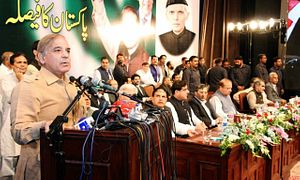Shehbaz Sharif — former chief minister of Punjab, current Pakistan Muslim League-Nawaz (PLM-N) president, and the party’s prime ministerial candidate for the general election — while reacting to the meeting between U.S. President Donald Trump and North Korean leader Kim Jong Un, stated that India and Pakistan should seek to emulate both countries and explore the possibility of resuming dialogue.
Sharif tweeted: “Singapore Summit between USA & North Korea should set a good precedent for Pakistan & India to follow.”
Sharif, an astute politician and a capable administrator, has generally refrained from commenting on India. More so after his elder brother, former Prime Minister Nawaz Sharif, got into trouble after his previous remarks on the Mumbai attacks. In an interview with Dawn, the former prime minister had said: “Militant organizations are active. Call them non-state actors, should we allow them to cross the border and kill 150 people in Mumbai?”
Nawaz Sharif drew flak for these comments, including from the National Security Committee (which includes top civil servants and defense officials) and even some parliamentarians of the PML-N. They had to be assuaged by Shehbaz Sharif.
Shehbaz Sharif’s statement on Twitter is thus significant, especially given the fact that recently the Pakistan Army, especially Pakistan Army Chief Qamar Javed Bajwa, has been making peace overtures toward India. Shehbaz Sharif, for his part, is seeking to send the signal that he is all for a better relationship with India. This will go down well with large sections of the population in Punjab (this includes not just members of civil society, but the business community as well).
As the Chief Minister of Punjab, Sharif had sought to strengthen people-to-people as well as economic ties with Indian Punjab. Sharif visited India in December 2013, and met with the then-Indian prime minister, Manmohan Singh, while also visiting his ancestral village Jatti Umrah in Punjab, India. Sharif had also attended the inauguration of the Integrated Check Post at Attari in April 2012.
In 2017, when both Punjabs and northern India were engulfed in smog, Sharif wrote to his counterpart in Indian Punjab, Captain Amarinder Singh, seeking a mechanism to tackle the issue of smog, as well as environmental pollution. Said Sharif, “Let us join hands for securing a prosperous future for the people of our two provinces.”
At the same time, in his recent tweet, Sharif also raised the Kashmir issue, perhaps because he does not want to appear as being excessively soft or as a sell-out, especially, vis-à-vis the hardliners and the military. Sharif tweeted:
If the United States and North Korea can return from the brink of a nuclear flashpoint, there is no reason why Pakistan and India cannot do the same, beginning with a dialogue on Kashmir whose heroic people have resisted and rejected Indian occupation.
Earlier, at a rally in April 2018, Sharif had also raised the Kashmir issue, saying, “We will make Kashmir part of Pakistan.”
Sharif’s tweet also no doubt has a domestic political motivation as well. He wants to ensure that the PML-N sets the agenda of the election campaign. With this tweet, he will force the PML-N’s main opponent, the Pakistan Tehreek-e-Insaf (PTI), to make its stance on ties with India clear.
PTI leader and prime minister candidate Imran Khan has so far given mixed signals on many issues, including ties with India. Khan has attacked Sharif for being soft on the Kashmir issue and stated that he will be far more vocal and raise the issue in international forums. At a rally in 2016, Khan stated: “Human rights are being trampled in Kashmir… And no matter what, we will support Kashmiris morally and politically.”
Khan has accused Nawaz Sharif of having a close rapport with Modi and bartering away Pakistan’s interests in the process. The PTI chief has also sought an inquiry into Nawaz Sharif’s business interests in India on more than one occasion.
On the other hand, on occasion, Khan has spoken about the need for improving India-Pakistan ties. Interestingly, during a visit to India in December 2015, Khan called on Modi and claimed to have had a constructive conversation on bilateral issues.
Shehbaz Sharif, a consummate politician, will essentially follow his brother’s approach of wanting to improve ties with India, while not ruffling feathers with the Pakistan Army. With his tweet, Sharif wanted to send a message to both the opposition (especially the PTI) and the establishment (the Pakistan military and Inter-Services Intelligence). The message to the PTI is that he will not allow it to set the agenda for the election. To the establishment, Sharif’s message is that he is ready to work with them, but will not play second fiddle.
Tridivesh Singh Maini is a New Delhi based Policy Analyst associated with The Jindal School of International Affairs, OP Jindal Global University – Sonipat (India).

































